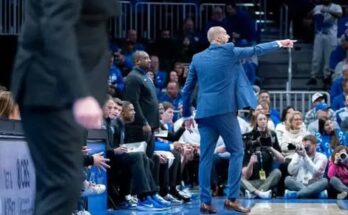Reed Sheppard becomes the second-youngest player in Houston Rockets history to record at least 30 points, 8 rebounds, and 5 assists in a single game, and his performance could not have come at a better time for a team that continues to search for rhythm, identity, and consistency during Emirates NBA Cup Group Play. From the moment he stepped on the floor, Sheppard played with an energy that instantly lifted the Rockets, setting the tone with aggressive drives, confident shooting, and an overall command of the offense that belied his youth. What stood out most was not just the scoring, though the points came in bunches, but the balance he showed in reading the game: when to attack, when to kick out, when to pull the defense in, and when to slow the pace to regain control. It was a performance that felt like a glimpse into his ceiling—something the organization and its fans have been hoping to see as he continues to develop within Houston’s evolving system.
Throughout the first half, Sheppard demonstrated a keen understanding of spacing, timing, and decision-making. He knocked down tough mid-range jumpers, got to the rim with deceptive quickness, and made plays in transition that breathed life into a Rockets offense that has struggled at times to generate clean looks. His rebounding presence was equally impressive, especially considering his size relative to some of the players he battled with on the glass. He chased down long rebounds, boxed out bigger opponents, and created second-chance opportunities that helped keep Houston’s offense flowing. Every possession he touched seemed to carry a sense of purpose, and his commitment to making the right play reinforced why the coaching staff continues to trust him with more responsibility.
As the game progressed into the third quarter, Sheppard’s confidence was unmistakable. Defenders began to play tighter, forcing him into contested situations, yet he remained poised, using ball fakes, subtle hesitation moves, and clever angles to create space. His ability to blend scoring with playmaking became particularly evident when he orchestrated several key possessions that resulted in open threes for teammates or easy finishes at the rim. He kept the defense guessing, never leaning too heavily on one part of his game, and in doing so he forced the opposing team to adjust constantly. These adjustments opened up additional opportunities for the Rockets, and Sheppard took full advantage by continuing to attack when the defense relaxed or overcommitted.
Defensively, Sheppard also made his presence felt. He fought through screens, closed out hard on shooters, and showed a willingness to step into passing lanes when the timing was right. His anticipation led to a couple of key deflections and transition opportunities that shifted momentum firmly in Houston’s favor. Even when he wasn’t the one directly involved in the play, his communication and awareness helped the Rockets maintain their defensive shape during crucial stretches. His competitiveness on both ends of the floor was evident, and it played a major role in keeping the Rockets composed in tough moments.
The fourth quarter showcased Sheppard at his best. With the game tightening and each possession growing more important, he displayed a level of maturity that few players his age possess. He slowed the pace when needed, sped it up when the defense lagged, and made two huge plays—one on offense, one on defense—that effectively swung the momentum back to Houston. His late-game scoring burst, which included an impressive finish through contact and a step-back jumper, brought out both the roar of the crowd and the admiration of his teammates. These moments weren’t just skillful—they were timely, and they demonstrated the type of leadership and composure that could make Sheppard a foundational piece for the Rockets moving forward.
But Sheppard wasn’t alone in shaping the outcome. Jimmy Butler III delivered a steady, impactful performance with 21 points, 5 rebounds, and 5 assists, giving Houston exactly the kind of two-way production they needed to remain stable throughout the night. Butler’s physicality, shot-making, and ability to read mismatches brought balance to the offense. When the Rockets needed someone to draw contact, get to the line, or create a high-percentage look, Butler stepped into that role with confidence. His scoring came in a variety of ways: cutting to the rim, hitting tough turnaround jumpers, and knocking down open threes when the defense collapsed on Sheppard.
Defensively, Butler was just as valuable. He matched up with some of the opponent’s best scorers, using his strength and footwork to make every shot difficult. He grabbed defensive boards in key moments and helped organize the Rockets’ rotational schemes when the opponent tried to mount a comeback. His veteran-like presence created a calming effect for the younger players on the floor, and his connection with Sheppard grew stronger as the game went on, resulting in several perfectly timed give-and-go sequences that highlighted Houston’s improved chemistry.
Together, Sheppard and Butler formed a dynamic, balanced duo that ultimately fueled the Rockets’ victory. Their combined efforts created a rhythm the team has been searching for during group play, and their performances served as a testament to how far the Rockets have come in terms of development, cohesion, and competitive identity. The win was more than just a group-stage result—it was a statement about the potential brewing within this roster and the exciting direction the team appears to be heading.
As the Rockets look ahead to the remaining Emirates NBA Cup games, Sheppard’s breakout night and Butler’s reliable impact will serve as both motivation and building blocks. The coaching staff will certainly take note of the synergy between the two, and the organization will continue to watch Sheppard’s growth with optimism. Performances like this do not simply pad stat sheets—they define players, shape team culture, and build confidence that can carry into the rest of the season. For Houston, this win was an important step forward, and for Sheppard, it may very well be the beginning of something even bigger.



